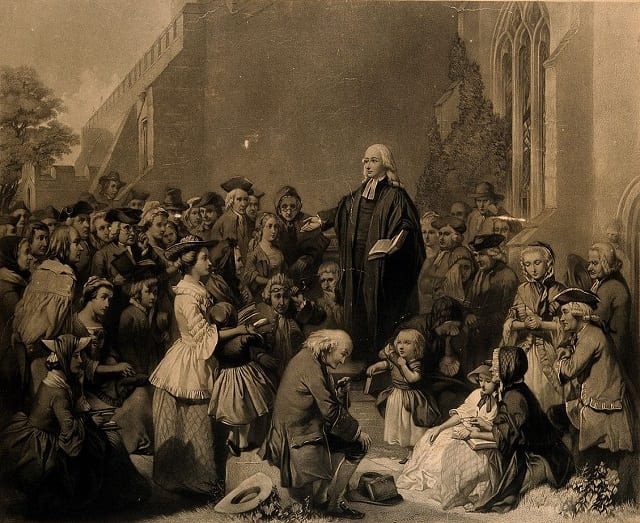
Catholics don’t deny at all that Protestants can and do have miracles in their midst. Personally, my wife and I both feel that we were healed as Protestants, from her severe pains of scoliosis, and serious depression in my case. I noted many miracles in the Wesleyan revivals, as I was compiling my book of John Wesley quotations.
What I think is really the bottom-line point in the overall discussion of miracles and the differences between Protestants and Catholics is one I noted soon after my conversion: that Protestants habitually do not require personal holiness (including attesting miracles) in major “reformers” and Christian reform. This is what was radically new.
In the Bible and Catholic tradition, wisdom and righteousness were intrinsically connected. The wise person was the holy person, and if they ceased being holy they ceased being wise (as in King Solomon’s infamous case).
Catholic reformers were traditionally very holy people, who not infrequently had attesting miracles (people like St. Francis of Assisi or St. Ignatius of Loyola). The new Protestant idea was to say that reform was not intrinsically connected to personal holiness, so that Martin Luther could supposedly reform the entire Catholic Church without being personally holy.
Protestants (as a broad generalization) — particularly Lutherans, for obvious reasons — go to great lengths to freely admit that Luther was an “imperfect man” and a flawed man (often noting his uncontrolled tongue, his statements about the Jews, etc.), but they simply don’t care in the end whether or not he was a holy and righteous man. It’s irrelevant to them. All they care about (again, bottom line) is what he taught and did, which they regard as mostly true and of a reforming nature.
The Wesleyan revivals (which were actually a movement within Anglicanism) were a glorious exception to this usual Protestant thinking. They were all about profound personal conversion and holiness and the serious following of Jesus as a radically committed disciple, and there were many miraculous occurrences during them.
Wesley had no notion of the separation of wisdom and holiness, as Luther and Calvin, and those who look to them as leaders, do. Sanctification and holiness was front and center in his revivals. And this is because he was a traditional Anglican, and remained so his entire life.
But one of the Catholic counter-arguments to the so-called “Reformation” (which was really a Revolt) was to challenge Protestants by saying: “where are your miracles and why do you casually accept these major flaws in the founders of your various denominations?” That’s a separate issue from whether any miracles at all are present in Protestant ranks. We don’t deny that they are.
It is the “cessationist” man-made tradition (largely in Calvinist ranks) that formally denies the possibility of any miracles after the apostolic age. That’s not our fight. It’s an in-house Protestant fight.
I would also add in passing that the “Reformation” was not much concerned at all with missions and evangelization, as the Catholic Church at the time very much was (which is why all of South and Latin America became Catholic, and portions of, e.g., India).
The Protestants were far more concerned with the obtaining of political power, and stealing of churches, and forbidding what was a 1500-year practice of Catholicism up to that point: in other words, coercive efforts rather than traditional methods of preaching and persuasion of others to become Christians.
And we know that Calvin in particular (over against Luther) — also Zwingli, and eventually even Luther’s right hand man Philip Melanchthon — denied that the eucharistic miracle took place in Christian worship every Sunday. In doing so, they separated the supernatural from Christian worship, making it primarily a matter of verbal inspiration from preaching.
And so it remains to this day: the sermon is the centerpiece, focus, and climax of most Protestant worship services, whereas for Catholics, Orthodox, and some more traditional Protestants (Lutherans and Anglo-Catholics), the Eucharist — which is a supernatural occurrence; a miracle — is the primary purpose and focus of Christian worship.
We literally encounter our Lord Jesus at every Mass, and receive Him not just in our hearts but in our physical bodies as well, so that God’s grace towards us abounds. That’s about as “personal” of a relationship to Jesus as can be imagined . . .
***
(originally 9-23-14 on Facebook)
Photo credit: John Wesley preaching outside a church. Engraving. This file comes from Wellcome Images, a website operated by Wellcome Trust, a global charitable foundation based in the United Kingdom. Refer to Wellcome blog post (archive). [Wikimedia Commons / Creative Commons Attribution 4.0 International license]
***













